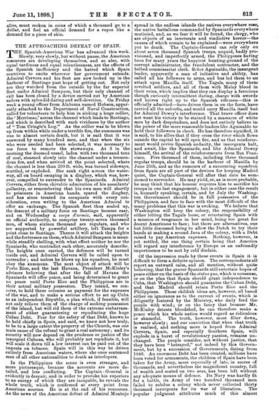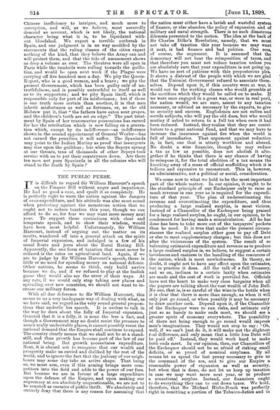THE APPROACHING DEFEAT OF SPAIN. T HE Spanish-American War has advanced
this week. Slowly, very slowly, but without pause, the American resources are developing themselves, and so also, with equal tardiness and equal relentlessness, are the effects of the Spanish inefficiency and the hatred which Spain contrives to excite wherever her government extends. Admiral Cervera and his fleet are now locked up in the harbour of Santiago past hope of getting out. Not only are they watched from the outside by the far superior fleet under Admiral Sampson, but their only channel of exit has been closed by a device carried out by American sailors with splendid daring and self-devotion. On Friday week a young officer from Alabama named Hobson, appar- ently attached to the Department of Naval Construction, called for volunteers to help him in sinking a huge collier, the Merrimac,' across the channel which leads to Santiago, and which is described with such vividness by the author of "Tom Cringle's Log." As the collier was to be blown up from within while under a terrible fire, the summons was one to almost certain death, but it is said that it was answered by many hundred men, and that when the six who were needed had been selected, it was necessary to use force to remove the stowaways. At 3 in the morning the doomed vessel, laden with two thousand tons of coal, steamed slowly into the channel under a tremen- dous fire, and when arrived at the point selected, where the channel is less than 200 ft. wide, was turned sideways, scuttled, or exploded. She sank right across the water- way, all on board escaping in a dinghey, which was, how- ever, compelled to surrender to the Spaniards. Admiral Cervera, either from chivalric admiration of his assailants' gallantry, or remembering that his own men will shortly be prisoners in American hands, spared the dinghey, and has since treated its occupants with every con- sideration, even writing to the American Admiral to offer an exchange. The Spanish fleet thus sealed up, the descent of a military force on Santiago became easy, and on Wednesday a corps d'armee, said, apparently on official authority, to comprise twenty-seven thousand men, of whom sixteen thousand are regulars, and who are supported by powerful artillery, left Tampa for a point close to Santiago. Thence it will attack the heights and the fortresses on them, which Admiral Sampson is mean- while steadily shelling, with what effect neither he nor the Spaniards, who contradict each other, accurately describe. The heights once carried, the defences will be turned inside out, and Admiral Cervera will be called upon to surrender ; and unless he blows up his squadron, he must obey the summons. The next object of attack will be Porto Rico, and the last Havana, President McKinley's advisers believing that after the fall of Havana the Spaniards will offer peace, and being determined to grant no peace until Porto Rico and the Philippines are in their actual military possession. They intend, we con- ceive, to hold these colonies as payment for the expenses of the war, and to make a serious effort to set up Cuba as an independent Republic, a plan which, if feasible, will not only relieve them of the charge of seeking possession of the island, but will rid them of the extreme embarrass- ment of either guaranteeing or repudiating the huge Cuban Debt. Fear for the safety of that Debt, known to be held chiefly in Spain, and said, we know not how truly, to be to a large extent the property of the Church, was one main cause of the refusal to grant a real autonomy; and its security will now depend on the prudence or justice of the insurgent Cubans, who will probably not repudiate it, but will scale it down till a low interest can be paid out of the imposts on tobacco. Spain will in this way be driven entirely from American waters, where she once sentenced men of all other nationalities to death as interlopers.
In the Philippines the scene is even stranger, and more picturesque, because the accounts are more de- tailed, and less conflicting. The Captain - General is evidently in despair, and in order to provoke his superiors to an energy of which they are incapable, he reveals the whole truth, which is confirmed at every point from American sources. He is at the end of his resources. As the news of the American defeat of Admiral Montojo spread in the endless islands the natives everywhere rose; the native battalions commanded by Spaniards everywhere mutinied, and, as we fear it will be found, the clergy, who are objects of an inveterate and vindictive horror—the causes of which remain to be explained—were everywhere put to death. The Captain-General can rely only on about seven thousand Spanish troops, unpaid, badly pro- visioned, and imperfectly armed, the Philippines having been for many years the happiest hunting-ground of the corrupt administrator, the fraudulent contractor, and the bribed commissariat clerk. Seilor Aguinaldo, the insurgent leader, apparently a man of initiative and ability, has called all his followers to arms, and has led them to an attack upon Manilla, itself. The Tagals, many of the= revolted soldiers, and all of them with Malay blood in their veins, which implies that they can display a ferocious though curiously intermittent daring, charge with swords and knives right up to the Spanish riflemen—this is officially admitted—have driven them in on the forts, have' carried all the suburbs, and would carry Manilla itself but for Admiral Dewey's interference. That brave officer does not want his victory to be stained by a massacre of white men by dark desperadoes, and does not entirely believe in the power of the more reasonable leaders like Aguinaldo to hold their followers in check. He has therefore signified, it is said, to his allies that if they cross the river which flows, outside the capital he will open fire, and as that reinforce- ment would revive Spanish audacity, the insurgents halt, and await, like the Spaniards, and like Admiral Dewey himself, the arrival of the reinforcements from San Fran- cisco. Five thousand of them, including three thousand regular troops, should be in the harbour of Manilla by June 25th, and as the rumours of a succouring squadron from Spain are all part of the devices for keeping Madrid quiet, the Captain-General will after that date be sum- moned to surrender. He may yield, or, as is more probable, he may think that his honour requires him to sacrifice his troops in one last engagement; but in either case the result is, humanly speaking, certain, and by July the Washing;. ton Government should be in full possession of the Philippines, and face to face with the most difficult of the many problems that this war is evoking. We believe that Washington will keep the colony, the responsibility of either letting the Tagals loose, or reinstating Spain with a mission of vengeance in her mind, being too great fop decent Americans to face ; but there are alternatives, one but little discussed being to allow the Dutch to try their hands at making a second Java of the colony, with a Debt raised to pay American expenses. Nothing, however, is yet settled, the one thing certain being that America, will regard any interference by Europe as an unfriendly impertinence to be met by cold disdain.
Of the impression made by these events in Spain it is difficult to form a definite opinion. The correspondents all report an outward calm, and all mention, without quite- believing, that the graver Spaniards still entertain hopes of peace either on the basis of the status quo, which is nonsense, or on the plan that Spain should grant independence to Cuba, that Washington should guarantee the Cuban Debt, and that Madrid should retain Porto Rico and the Philippines. These childish ideas are, however, all based either on ignorance as to the current of events, which is diligently fostered by the Ministry, who daily feed the people with wind ; or on the fancy that because Mr.. McKinley detests bloodshed, he can therefore make a, peace which his whole nation would regard as ridiculous or shameful. The truth, however, must filter down, however slowly ; and our conviction that when that truth is realised, and nothing more is hoped from Admiral Cervera, Spain, and especially Southern Spain, will explode in a burst of revolutionary passion, remains un- changed. The people consider, not without justice, that they have been "betrayed," not indeed by this Govern- ment, but by a succession of Governments, dating from 1848. An enormous Debt has been created, millions have been voted for armaments, the children of Spain have been taken for the Army, more especially of late, in scores of thousands, and nevertheless the magnificent country, full of wealth and seated on two seas, has been left without any adequate means of defence. Its Navy was hardly fit for a battle, its Army of two hundred thousand men failed to subdue a colony which never collected thirty thousand insurgents for its war of liberation. The popular judgment attributes much of this almost Chinese inefficiency to intrigue, and much more to corruption, and will, as we believe, most assuredly demand an account, which is not likely, the national character being what it is, to be liquidated with- out bloodshed. We expect a terrible outbreak in Spain, and our judgment is in no way modified by the statements that the ruling classes of the cities expect nothing of the kind, that they believe the Army can and will protect them, and that the tide of amusement shows as deep a volume as ever. The theatres were all open in Paris while the tumbrils were rolling towards the guillo- tine, and would be open next week if the Plague were carrying off five hundred men a day. We pity the Queen- Regent, who is a good woman, and a brave ; we pity the present Government, which has been guilty only of un- truthfulness, and is possibly untruthful to itself as well as to its supporters ; and we pity Spain itself, which is responsible only for part of its misfortunes ; but if there is one truth more certain than another, it is that men inherit misfortunes as well as fortunes, or, as the old Hebrew put it, that "the fathers have eaten sour grapes, and the children's teeth are set on edge." The past treat- ment by Spain of her transmarine possessions has earned for her the retribution which is now falling on a genera- tion which, except by its indifference—an indifference shown in the second appointment of General Weyler—has not earned the penalties it will suffer. The Spaniards may point to the Indian Mutiny as proof that insurgents may rise upon the guiltless ; but when the Sepoys sprang at our throats, tens of thousands of other Sepoys took service with us to put their countrymen down. Are there ten men not pure Spaniards in all the colonies who will stand to the death by Spain ?







































 Previous page
Previous page